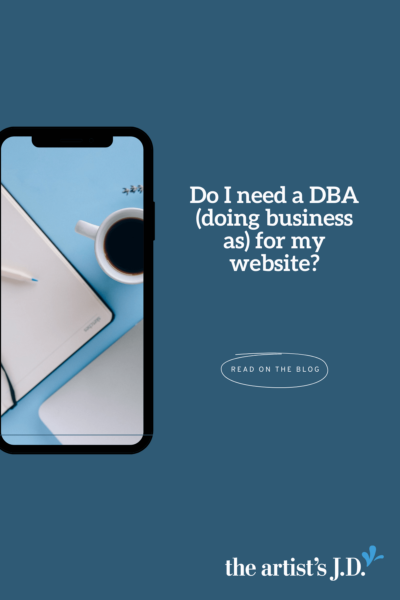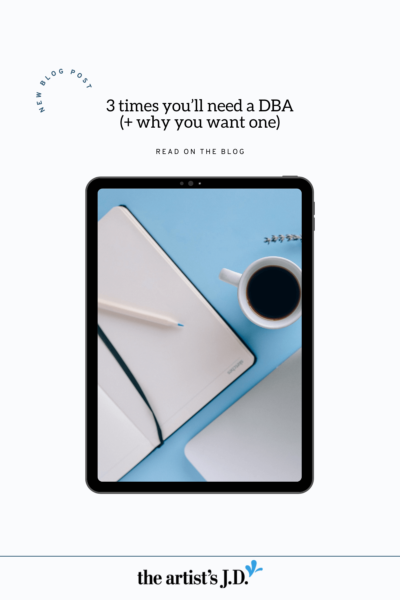Does your business need to file for a doing business as (dba), fictitious business name (fbn), assumed name, or trade name?
Stop wondering and learn when you need one and why you’ll want to get one (hint: 💰💰💰)
By the end of this video and post, you’ll know:
- What a DBA is and isn’t
- 3 times you’ll need a DBA
- Why you want to get one (even if it’s a hassle)
- How to get one
Watch the short version | Read the long version
Watch
Show notes
- Watch this video to learn how to decide if you should have multiple brands or businesses in the same LLC
- Grab my book that helps you complete enough legal tasks to confidently launch (or grow) your business, knowing you have all your legal ducks in a row
- Read this post to learn how to pick a business name that won’t land you in legal hot water
- Learn more about the artist’s Courtyard membership community here
Does your business have the required permits and licenses?

Did you know that a dba is only one of the government permits and licenses your creative business might need?
Inside my book, I’ll guide you step-by-step to feel confident that your business has the correct permits and licenses. The book also gives you a straightforward strategy to protect your ass(ets) without legal confusion. It’s the go-to guide you need to get all your legal ducks in a row.
(If you use the above Amazon affiliate link, I’ll make a small commission, but it doesn’t change the price you pay.)
Read
Something that might surprise you, is the name of your creative business might be a nickname under the law.
What a DBA is

A DBA goes by four different names. It’s a:
- doing business as (dba)
- fictitious business name (fbn)
- assumed name
- trade name
All four of these names describe the same concept:
Allowing you to do business as something other than your legal name.
All a DBA is doing is allowing you to have a fun, creative name for your business that doesn’t match up with your legal name (either yours or your LLC/corporation). That’s all it’s doing, functioning as a legal nickname.
The reason you have to file for a DBA is that if something goes wrong, your clients and customers need to understand who is legally responsible for that business. And so after you get one, there will be a record of who is the legally responsible person for that business.
That’s all a DBA is doing: allowing you to have a fun creative name for your business that isn’t your legal name.
What a DBA isn’t
Since your DBA is really a nickname, that means it’s not the same as creating an LLC.
Because both LLCs and sole proprietors can have a DBA.
You create an LLC to put a fence between your business life and your personal life. So if anything goes wrong, the problem stays on its own side of the fence and can’t cross over.
And filing for a DBA isn’t the same thing. There’s a totally different process that you have to go through to become an LLC and put up that fence. So a DBA is not going to provide you that kind of protection and put up that fence.
A DBA also isn’t the same thing as going to the USPTO and filing for a trademark. Once again, there are whole different costs, procedures, and forms you have to file in order to make that happen.
All DBA is doing is allowing you to have a fun and creative name for your business that aligns with what you’re doing for your clients or customers.
It’s not again putting up an LLC fence or giving you a registered trademark.
When do you need a DBA?
Now that you know what it is and what it isn’t, when do you need one?
There are three times when you’re going to need to get a DBA for your creative business.
- If your name isn’t the same as your business name
- If your LLC name isn’t the same as your business name (often because you have multiple brands in the same LLC)
- When your business name implies that there are multiple business owners
To help you understand, I put together five examples of when a creative business will and won’t need to file and obtain a DBA.
Do I need a DBA for my LLC?

Our first example is Molly the Maker.
Molly has a New York LLC. And her LLC’s name is Molly Knits, LLC.
However, her website, social media accounts, and everything else associated with her business are Knits by Molly.
Because Molly’s LLC name is different from her public-facing business name, she will need to obtain a DBA.
Do I need a DBA if I have multiple brands in the same LLC?

Our second example is for someone with multiple brands or businesses under the same LLC umbrella.
Courtney has a California LLC and this LLC’s name is CC Coach LLC.
However, she has two brands:
- Coaching by Courtney
- CC Career Coach
Because her brand names are not the same as her LLC name she also will need a DBA.
Now if one of her brand names was CC Coach and the other was Coaching by Courtney, she would only need to obtain the DBA for the Coaching by Courtney brand name.
Psst…If you’re curious if you should have multiple brands or businesses under the same LLC umbrella, then check out this video. It talks you through how to make that decision and when it is (and isn’t) a good idea.
Do I need a DBA if I don’t use LLC at the end of my business name?

Our third example is something that comes up a lot. And that’s for those of you that have an LLC but don’t always want to include LLC at the end of your business name.
- LLC name: Molly Knits LLC
- Public name: Molly Knits
The problem is that different locations have different rules.
In some places, you don’t need to file for DBA, if you’re dropping the LLC.
While in some places, if you don’t want to have that LLC at the end of your name, you’re going to need to file a DBA.
Do I need a DBA if my personal name isn’t in my business name?

Our fourth example is Thomas the Teacher.
Thomas is a sole proprietorship and his legal name is Thomas Smith. But his business name is Mighty Websites.
You’re not going to be surprised that since his legal name doesn’t align with his business name, he’s going to need a DBA.
If his business name was Smith Designs Mighty Websites, then he probably won’t need a DBA because his last name is included in his business name.
Do I need a DBA if my business name indicates multiple business owners?

Our final example is Claire the Curator. Claire is also a sole proprietor and her legal name is Claire Jones. However, her business name is Claire Jones and Company.
Because “and company” implies that there are multiple business owners, Claire will need to obtain a DBA.
Why should you get a DBA?
Why should you go through the headache of going down and figuring out how you’re going to file for your DBA? And then going through the process, paying the money, and doing everything that’s needed to do it.
Why should you do it?
The big reason is money.
If you don’t have a DBA, your bank isn’t going to let you accept payment in the name of your business. You will only be able to accept payment in your legal name.
The DBA allows you to have your clients or customers write checks or provide payment to your business’s name.
So that’s the number one reason why you’re going to go through and deal with this legal red tape because you want to be able to accept payment in your business’s name.
Does your business have the required permits and licenses?

Did you know that a dba is only one of the government permits and licenses your creative business might need?
Inside my book, I’ll guide you step-by-step to feel confident that your business has the correct permits and licenses. The book also gives you a straightforward strategy to protect your ass(ets) without legal confusion. It’s the go-to guide you need to get all your legal ducks in a row.
(If you use the above Amazon affiliate link, I’ll make a small commission, but it doesn’t change the price you pay.)
How do you get a DBA?

Now that I’ve convinced you it’s a valuable thing to do for your creative business, how do you do it?
Unfortunately, I have to give you the terrible lawyer answer, “it depends.”
And the reason it depends is because of this is usually done on a county basis. And across the United States, we’ve got 3,142 counties.
Every county will:
- pick from one of those four names to decide what they’re going to call it
- have a different form
- have different fees
- have different newspaper publishing requirements
So, unfortunately, all I am going to be able to tell you to do is hop over to Google and type in “Your county name” + “doing business as.” And then look at the results.
When you look at the results, make sure you find the page that’s on your county’s website, not another website.
You want to get the information straight from your county.
Once you’ve either decided you don’t need a DBA or you’ve gotten your DBA, then you are well on your way to tackling the six must-do tasks that I think are a minimum for every creative business.
Want help getting all your legal ducks in a row?

Wish you had a straightforward strategy to protect your ass(ets) without legal confusion? Then the Legal Roadmap book is your go-to guide.
Inside this book, you’ll find three Maps that will help you build a business you love, built on a strong legal foundation. And you’ll get my guidance step-by-step to execute each of the action items contained in the Maps.
(If you use the above Amazon affiliate link, I’ll make a small commission, but it doesn’t change the price you pay.)
Do you still have questions?
No shame in that! One of the perks of membership in the artist’s Courtyard is a 24/7 private online community to ask your questions and get my answer (and insights from other creatives). Already a member? Ask your question! Not a member yet? Join us inside the artist’s Courtyard for $45/month!

Hi! I’m Kiff! I’m your friendly legal eagle (and licensed attorney).
My goal is to add ease to the legalese. And because I think basic legal resources should be available to every creative, I create a lot of free content.
If I’ve created something that has helped inject a little ease into your creative business and you would like to say “thank you”, you can make a contribution here.
If you’d like to hear more from me, I’d love to pop into your inbox every Friday morning to share additional ways to cut through the red tape and inject a little ease.
Get tips from your friendly legal eagle in your inbox…
Your privacy is important to us. Learn how we protect it here.

